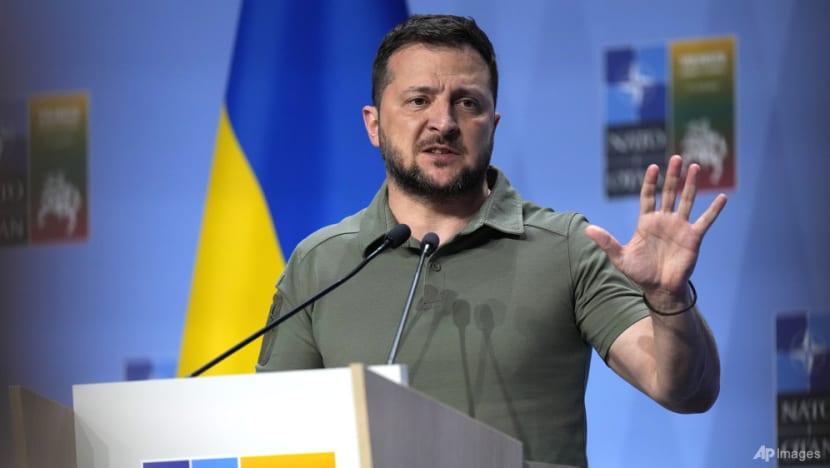Commentary: What Ukraine wants might not be what it needs for peace
Ukrainian President Volodymyr Zelenskyy was clearly angry after NATO didn’t offer Kyiv membership. Considering the risk, it’s amazing anyone even argued for it, says Pusan National University’s Robert Kelly.

BUSAN: It was remarkable that Ukrainian membership was even seriously discussed at the North Atlantic Treaty Organization (NATO) summit in Vilnius, Lithuania this week. Similarly surprising was Ukrainian President Volodymyr Zelenskyy’s anger at rejection of immediate membership.
“Ukraine’s future is in NATO,” a declaration by the leaders on Tuesday (Jul 11) said, adding that NATO would be in a position to extend an invitation to Ukraine to join the alliance when allies agree and certain “conditions” are met.
Mr Zelenskyy was on his way to the annual summit when he received word of the draft of the communique. It was clear he was upset with NATO, which had promised in 2008 that Ukraine could one day join the alliance.
“It’s unprecedented and absurd when time frame is not set neither for the invitation nor for Ukraine's membership,” Mr Zelenskyy tweeted on Tuesday. He appeared more conciliatory on Wednesday. “I am confident that after the war Ukraine will be in @NATO. We will do everything for this,” he tweeted.
Member states have been divided over Ukraine’s desire to join the alliance. It’s been slightly over 500 days since Russia invaded Ukraine on Feb 24, 2022. As the battle grinds on, Russian gains have stopped, but Ukraine is struggling this year to replicate its successful counteroffensives of 2022.
Ukraine may still break through in the coming months, but a long war looks likely. Ukraine may well win, but it will likely come after a protracted slog in which Russia slowly exhausts itself in pursuit of an impossible victory.
MEMBERSHIP DURING A WAR?
A quagmire-like conflict is an awkward circumstance for a NATO applicant to be in. NATO is a collective defence organisation, and its founding treaty requires its member states to fight for each other if attacked.
Ukrainian accession during a war - especially one that looks to drag on for years - would logically require NATO to enter that war on Ukraine’s behalf. While Kyiv would obviously like that, the risks - especially of nuclear escalation - are obvious in any NATO-Russian conflict.
NATO has long sought to help Ukraine, but its leaders have made clear since the start of the war that they will not enter the conflict directly. No one wants a wider, possibly nuclear, war to emerge from what is now a limited, conventional conflict.
Far more realistic is Ukraine’s membership after the war’s conclusion. Indeed, United States President Joe Biden has indicated his comfort with this option. More broadly, the Western foreign policy community has come around to this alternative.
A year ago, Ukrainian NATO membership was widely seen as too risky - a provocation to Russia that would justify its war. Today, even Henry Kissinger, dean of power politics thinking in the West, has changed his view to support Ukrainian membership.
NATO LESS WORRIED ABOUT RUSSIA’S RESPONSE
Russian battlefield weakness, coupled with its harsh tactics in the war, seem to have changed thinking on Ukraine in NATO. Keeping Ukraine out of NATO was previously a way to placate Russian power and prevent a new Cold War in Europe. But the war has, in fact, revealed Russian weakness.
Russia aspires to great power status, to contend at the top table of world politics with the US, China, and the European Union. But it is no longer able. The war is eroding Russia’s economy, and sanctions are worsening that.
Shockingly, Russia has proven unable to militarily defeat a middle power with weak state institutions. It is now diplomatically isolated. NATO no longer fears Russia as it once did. Hence the accession discussions around Finland, Sweden, and now Ukraine.
If Russian weakness lowers the geopolitical costs of inviting Ukraine, Russian savagery heightens the moral argument. Russia has shelled and bombed Ukrainian civilian targets since the start of the war.
Its troops have been accused of torture, rape, and murder in occupied areas. The International Criminal Court has issued an arrest warrant for Russian President Vladimir Putin for unlawfully deporting children out of Ukraine.
The result is new thinking on Ukraine in NATO. Kyiv has certainly earned the privilege of NATO membership through its terrible suffering, but accession may not be the wisest course.
The threat of eventual Ukrainian membership may encourage Russia to dig in its heels on the war indefinitely. If Ukraine becomes a “frozen conflict” with a semi-permanent Russian presence - as in Georgia - NATO accession will be indefinitely blocked.
TRADING NATO MEMBERSHIP FOR RUSSIAN CONCESSIONS?
There is an alternative. Russia ostensibly invaded to prevent Ukraine from joining NATO. If that concession is granted, then Russia must withdraw by its own principles or be revealed as an imperialist.
Peace plans kicked around last summer noted this, and they are still a viable alternative to the years of hard, bloody warfare ahead. In those discussions, a commitment to exclude Ukraine from NATO was broached as a concession if Russia would withdraw, including from Crimea.
Ukraine is understandably wary of any deal that would shut it out of NATO. Russian President Vladimir Putin might well take the time off from the war to reconstitute and then attack again.
To compensate, Ukraine could be offered membership in the European Union, plus a deep security relationship with the West along the lines of Finland and Sweden’s relationship with NATO (before they recently joined the alliance), or Israel’s relationship with the US. And of course, should Putin invade again, the NATO exclusion commitment would be dropped immediately.
This is not an ideal outcome for Ukraine. Understandably, it feels that Russia should exit its sovereign territory and that it should be able to determine its own alliance choices. But insisting on NATO membership will almost certainly incentivise Russia to fight harder. Ukraine may prefer to run that risk. The choice is ultimately up to Kyiv.
But the alternative is a long, bitter war, even if Ukraine will likely win it. Aggressors fighting unnecessary wars against determined, mobilised enemies often give up out of exhaustion and just go home. This happened to the French and Americans in Vietnam, and to the Soviets in Afghanistan. It will likely happen to the Russians in Ukraine.
But it took almost a decade in each of those cases before the larger state tired and withdrew, and millions died in the process. Is it worth for Ukraine to suffer on that scale, when trading away NATO might get it most of what it wants?
Dr Robert E Kelly (@Robert_E_Kelly; RobertEdwinKelly.com) is a professor in the Department of Political Science at Pusan National University.


















